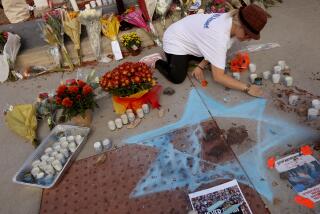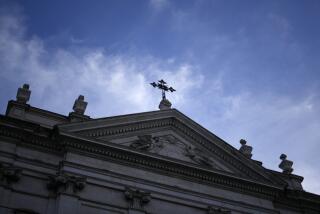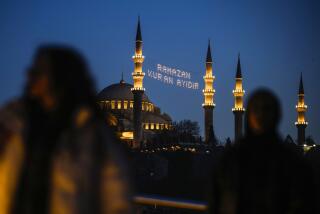From the archives: Germany making room for Muslim educators
The son of an immigrant coal miner, Musa Bagrac was raised in a city of steam and smoke, a place where men walked with crumpled lunch bags in calloused hands and Muslims felt adrift in makeshift mosques shadowed by church steeples.
Bagrac moved like an unsure spirit between two worlds. In Hamm, his hometown about 20 miles south of here, he attended St. Joseph’s Elementary, where he sang “O Tannenbaum” in the choir. Twice a week he went to an Islamic school, learning the Koran and about the prophet Muhammad, wondering how to escape the working-class life of most German Turks.
“We need poets, doctors and a middle class that German Muslims can aspire to,” said Bagrac, a 28-year-old university student with a wide face and sideburns. “Germans have come to see Islam as a religion of the working class. But Islam is a religion of all classes. That’s why it’s so important to get more Muslim teachers into schools.”
Bagrac is a missionary of sorts in this nation of 3 million Muslims — nearly 4% of the population. He and about a dozen other students at the University of Muenster are enrolled in the first course of its kind in Germany: a curriculum preparing Muslim instructors to teach Islam in public schools while being sensitive to Western culture.
Such ambitions have arisen against the backdrop of a troubling arc of violence, from the Sept. 11 attacks to last year’s train bombings in Madrid to this summer’s assaults on London’s transit system. The Islamic extremists’ war against Europe is widening, and conservative and liberal politicians across the continent are perplexed about how to better integrate a Muslim community that has doubled since the 1980s but remains in a largely parallel universe.
Young Muslims such as Bagrac personify the intersection of the Islamic creed and European life. They carry iPods and hang out at dance clubs. Many are more attuned to reality TV than the bloody politics of Iraq. But they also pray five times a day, wanting to be devout without being stereotyped as fanatical. Most believe they can keep their faith despite the increasingly secular atmosphere around them.
They move not apprehensively, but in a manner that suggests there is an invisible yet impenetrable divide between them and native Europeans. Some are demure. Others are quiet but forthright. A few are angry. They sip nonalcoholic beer and sweet tea; some of the more intense among them quote from both the Bible and the Koran.
They have learned how to politely refuse “currywurst,” or pork sausage, sandwiches. And most have grown used to, though some still blush at, the public nudity in parks and on billboards advertising sex shows.
This is a continent where Christmas, Hanukkah and Ramadan coexist, and national constitutions eloquently uphold human rights. But the rising militancy among young Muslims has challenged those constitutions and cast a shadow on the meaning of being European.
“Learning Islam in school will finally give Muslim children the feeling of being home,” Bagrac said of his course, which awaits final state approval and may start graduating prospective teachers within three years.
“That’s something we wanted for so long, to feel at home in this country. If Muslim kids feel accepted by public schools, the schools will become synonymous with the state and it will improve cultural coexistence.”
Bagrac’s classmate Denya Abou Zaher wears a head scarf embroidered with butterflies, a badge of Islam that sets her apart in the nation she hopes one day will embrace her.
“If a Muslim lives in a Western society, he has to stick to the laws of Western society. He can’t say he wants an Islamic state,” said Zaher, 25, whose parents are Palestinians who emigrated here from Lebanon in 1970. “We were not influenced in fundamentalist directions. Islam can coexist with democracy. It comes down to tolerance.”
Tolerance is often clouded by cultural prejudices as Europe’s desire to preserve its identity collides with a growing Muslim population. Zaher, for example, will be limited in where she can teach. Seven of the 16 German states consider the head scarf a potent religious symbol and forbid public school teachers to wear it.
Germans want Muslims to accept Western ways, said Zaher, who has worn a head scarf since she was a girl, and are often unsympathetic to Islamic beliefs.
“I can’t wear a head scarf if I want to teach in Bavaria,” she said. “The irony is that Europeans think the head scarf is a symbol of oppression, but by not letting me teach, isn’t that a kind of oppression too?”
When Zaher left class, she walked across cobblestones, along a vegetable market and past alleys humming with bicycles. Steeples rose and stained glass glimmered. The city center was all burnished stone and leafy trees, resembling a postcard from a bygone Europe. No minarets appeared on the skyline.
A few Germans peered discreetly over ice cream cones and espressos when Zaher and her husband, Nahel Ghanem, a big, bearded man wearing a suit, strolled past. The couple are exotic to some, worrisome to others, a reminder that perhaps one day the Muslim call to prayer will echo from the city’s ragged neighborhoods and farther into its richer ones. Zaher straightened her long skirt and sat in a sunlit cafe, paying attention but not paying attention, used to the lingering eyes.
Zaher traces her lineage to the Palestinian diaspora, but it was a mosque in a poor Muenster neighborhood that gave her her identity. Her grandparents fled Palestine when the state of Israel was formed in 1948. Her parents were born in the grit and torment of Beirut; she was born in a swath of Muenster where crime and drugs are never far from stoops and playgrounds. Her father, not a religious man, worked as a laborer and taxi driver. Her mother raised 10 children.
“I started going to the mosque in the seventh grade and was suddenly at ease with who I was,” she said. “I learned in the mosque that there are equal rights for women. I realized I had this power in myself, and then I had the power to tell my German girlfriends that I was a Muslim. They accepted it.”
When she becomes a teacher one day, she said, she wants to remember these things. “We lived in a poor district,” Zaher said, “and many of the kids who didn’t go to the mosque ended up in jail or on drugs.”
Islam is now taught in schools but not comprehensively enough for many Muslim families. Zaher’s responsibility, she said, will be to take what she knows from the West and what she knows from the Koran and stitch them into school lessons. Can they blend seamlessly?
She and Bagrac and others in her class wonder about that. They debate issues such as arranged marriages, permitted by Islamic custom but deplored by German society, and the merits of separate gym classes for boys and girls in elementary schools to preserve the Muslim sense of modesty. And how can Koranic prescriptions on matters such as inheritance, written centuries ago, speak to today’s followers living in Western society?
“I want to give the kids a general picture of Islam so they can separate the things done by man and what the religion actually says,” said Zaher, a mother of two. “Islam is tolerant. It’s not Muslims saying, ‘I only want to live with Muslims.’ ”
Her husband nodded. “People today are too suspicious of Islam,” he said. “I came here to study. I have a beard, and they think I’m part of a sleeper terrorist cell.”
Zaher thumbed through a book and pointed to two pictures. One was of the Virgin Mary, the other of Mother Teresa. “Look at these two women,” Zaher said. “They both wore head scarves.”
Bagrac understands how one culture’s icon can be another’s threat. His father left the Turkish Black Sea town of Ordu in 1970 to work in the coal mines near Hamm, south of Muenster. Bagrac’s mother followed in 1976, and he was born a year later. Growing up, he said, was like skipping between cultures — the Catholicism of St. Joseph’s and Islamic customs at home.
“I had this ambiguous feeling,” he said. “I knew I was a Muslim going into a Catholic church, but my mother told me, ‘Don’t worry, it’s still a house of God.’ ”
It wasn’t until he reached the 11th and 12th grades in a public school filled with the sons and daughters of immigrants that he began to realize how Islam worried and intrigued many Germans.
“A German TV show came to our school, and suddenly we became perceived as an outpost of fundamentalism,” Bagrac said. “It was a time when Germans were discovering that they were a multicultural country and they were beginning to learn to live with it. It’s been a learning process, but a certain balance has happened over the last 10 to 15 years.”
Bagrac served his compulsory year in the German army after high school. Then he drifted. He married, but jobs were sparse in Hamm. The region stopped smelling so much of sulfur and coke. As the sky cleared, and barge traffic thinned on the Lippe River, there wasn’t so much left to do for the sons and grandsons of Turkish guest workers who had arrived decades earlier.
Bagrac’s father, who spoke little German, urged him to master the language and find something new. “When my father was still alive, I asked him, ‘Did you pick this apartment we live in?’ He said, ‘No. This was the place they told me to go.’ You see, society told us where to live. But future Muslim generations will be able to live in all corners of society.”
For Bagrac, the way to this future is with textbook and chalkboard. “A religion teacher can be a contact for Muslim children and the state,” he said. “We can be a connecting link because teachers can be trusted by both sides . Even on his deathbed my father told me to get educated. He said that we Muslims must not stay workers, we must climb.”
He looked at his watch and checked his folder. He had to go. He and a Protestant minister were meeting to give a lecture on Jesus and the Koran.
Fleishman was recently on assignment in Muenster.
More to Read
Start your day right
Sign up for Essential California for news, features and recommendations from the L.A. Times and beyond in your inbox six days a week.
You may occasionally receive promotional content from the Los Angeles Times.







